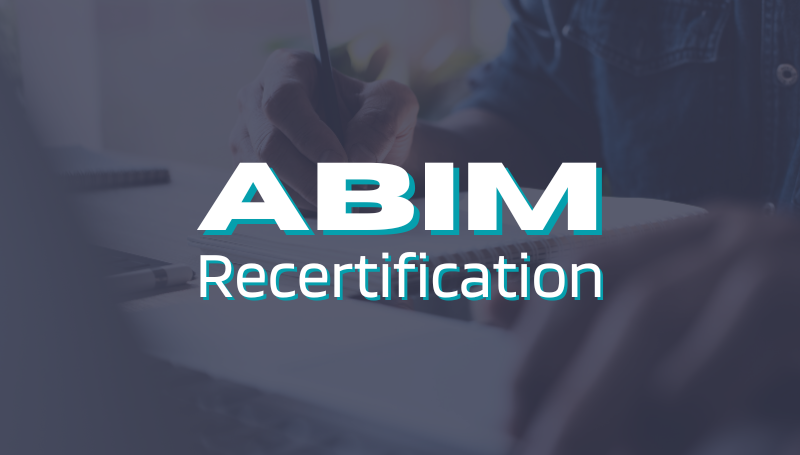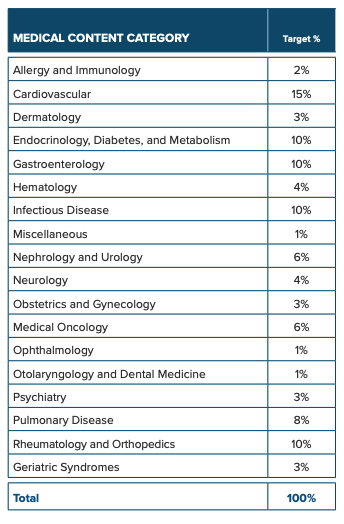Everything you need to know about ABIM recertification

Key points
- In order to maintain ABIM board certification, all physicians must participate in the MOC program.
- To maintain ABIM certification, you must earn 100 MOC points every 5 years. Every 10 years, you must pass a MOC assessment, which includes the traditional exam or the Longitudinal Knowledge Assessment.
- The traditional ABIM recertification exam is a 10-year exam comprised of up to 220 single best-answer multiple-choice questions, broken into 4 sessions in a 1-day proctored testing environment.
- The longitudinal exam is a five-year cycle, where you answer questions on an ongoing basis and receive feedback about your performance along the way.
- Both ABIM MOC exams use the same ABIM MOC exam blueprint for its questions, so any topic on the blueprint is fair game for questions.
American Board of Internal Medicine (ABIM) recertification, also known as Maintenance of Certification (MOC), is a program designed to evaluate and validate the ongoing competencies of physicians in internal medicine and its subspecialties. Traditionally, as part of MOC requirements, physicians would take a 10-hour recertification exam.
Since 2022, the ABIM has offered internists and other subspecialists the option of a longitudinal assessment as an alternative to the traditional ABIM Maintenance of Certification (MOC) Exam.
ABIM maintenance of certification requirements
In order to maintain ABIM board certification, all physicians must participate in the MOC program. To participate in ABIM MOC, you must
- have an active, valid, and unrestricted medical license
- earn MOC points every 2 years through a variety of educational and self-assessment activities. You must participate in a MOC activity every 2 years, and you must earn 100 points total every 5 years (which equates to about 100 hours of work every 5 years).
- pass a MOC exam to assess your clinical knowledge and judgment in internal medicine or a specific subspecialty.
How often do you need to recertify with the ABIM?
To maintain ABIM certification, you must earn 100 MOC points every 5 years. Every 10 years, you must pass a MOC assessment, which includes the traditional exam or the Longitudinal Knowledge Assessment.
What happens if my ABIM certification lapses?
If your ABIM certificate lapses, you can meet your assessment requirement by taking the traditional or LKA MOC exam. Since the LKA exam is on a 5-year cycle, if you choose that exam option with a lapsed certification, you will not regain certification for 5 years.
The ABIM recertification exam
The traditional ABIM recertification exam is a 10-year exam comprised of up to 220 single best-answer multiple-choice questions. 50 of these are "new" questions that won't count in your score. Most questions describe clinical scenarios and ask about the work you do during your normal course of practice.
The questions on the exam consist of a brief statement, case history, graph, or picture followed by a question and a list of possible options. You must choose the one answer that is better than the others (some options may be partially correct).
ABIM’s Longitudinal Knowledge Assessment for MOC is the new longitudinal exam option. It's a five-year cycle exam where you answer questions on an ongoing basis and receive feedback about your performance along the way. This exam also uses the ABIM MOC exam blueprint for its question, and any topic on the blueprint is fair game for questions.
The ABIM MOC exam blueprint
The recertification exam is designed to evaluate whether you, as a certified Internist, have maintained competency and currency in knowledge and judgment required for practice. The exam content is outlined in this blueprint, developed annually by the ABIM.
In July 2023, the ABIM released a new blueprint for the ABIM Internal Medicine MOC exam. The picture below shows the major medical content categories that define the domain for the Internal Medicine MOC and Longitudinal Knowledge Assessment (LKA) exams. The relative distribution of content is expressed as a percentage of the total exam.
The ABIM blueprint for MOC exam
While we’ll never know exactly the questions that’ll be on the recertification exam, we can look to the ABIM blueprint to discover the topics that they’ll be testing on, as well as the percentage weight of each topic in the exam. MedStudy Internal Medicine tools are carefully created according to the ABIM blueprint.
That means that the content in MedStudy study tools will be reflective of what you’ll see on the exam, with a balance of scenarios that are relevant to primary care and hospital care, including
- Making a diagnosis
- Ordering and interpreting results of tests
- Recommending treatment or other patient care
- Assessing risk, determining prognosis, and applying principles from epidemiological studies
- Understanding the underlying pathophysiology of disease and basic science knowledge applicable to patient care
How many questions are on the ABIM recertification exam?
The traditional ABIM MOC exam has up to 220 case-based multiple-choice questions broken into four sessions.
The Longitudinal Knowledge Assessment has 30 questions per quarter over 5 years for a total of 600 questions, 500 of which will be scored (test takers can skip up to 100 questions in the 5-year test period).
ABIM recertification exam dates
If you choose to take the LKA, you will receive your first set of 30 questions in January 2024, which you must choose to answer or skip by 3/31/24 at 11:59 p.m. ET.
These are the traditional MOC exam dates for internal medicine in 2024:
- April 2, 4, 8, 2024
- Oct. 8, 14, 15, 2024
ABIM Internal Medicine recertification exam pass rates
- ABIM certification pass rates for 2022: 94%
- ABIM certification pass rates for 2021: 95%
- ABIM certification pass rates for 2020: 95%
- ABIM certification pass rates for 2019: 95%
- ABIM certification pass rates for 2018: 93%
The majority of Internal Medicine physicians are switching to the new Longitudinal Knowledge Assessment for their ABIM recertification exam. In 2022, almost 3,700 recertifiers took the traditional exam while over 19,000 took the LKA.



.png?width=2048&height=1219&name=ABIM%20LKA%20guide%20(1).png)
